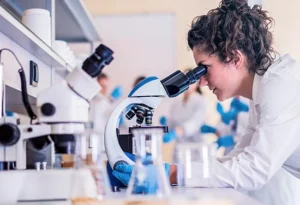
From left to right: Dr. Rémi Rabasa-Lhoret, Dr. Philip Toleikis, Dr. Mark Poznansky, Dr. Kathy McCoy and JDRF Chief Scientific Officer, Dr. Sarah Linklater
Earlier this month, JDRF celebrated a year of tremendous achievements and welcomed prominent scientists in the field to discuss their work at its You are JDRF Conference.
Held at Toronto’s BMO Institute of Learning from April 30-May 1, the annual event showcased revolutionary advances in type 1 diabetes (T1D) research and paid tribute to JDRF volunteers, staff and partners who helped make these successes possible. It also shared expert strategies on how to improve fundraising capacity throughout the organization to further its mission to find a cure.
“Thanks to the generous support we received, 2018 was a remarkable year for JDRF,” says Dave Prowten, President and CEO. “Not only were we able to fund cutting-edge research that is paving the way to novel treatments, but we also made important inroads to improve access and affordability to technology for all Canadians living with T1D.”
Among the key research highlights of the conference were:
 How does your gut microbiome affect development/progression of T1D?
How does your gut microbiome affect development/progression of T1D?
Kathy McCoy, University of Alberta
Dr. Kathy McCoy is interested in the dynamic interplay between the gut microbiota and our immune systems. Her research aims to understand how exposure to intestinal microbes, particularly during early life, educates and regulates the immune system and how this can affect susceptibility to diseases, such as allergy, autoimmunity and autism.
Dr. McCoy’s lab also investigates how the microbiome regulates the immune system throughout life with the goal of identifying microbial therapies for the prevention or delay of type 1 diabetes onset in susceptible individuals.
 Development of a new technology to enable transplantation of human stem cell-derived beta cells without immune suppression
Development of a new technology to enable transplantation of human stem cell-derived beta cells without immune suppression
Mark Poznansky, Massachusetts General Hospital
Dr. Mark Poznansky founded the MGH Vaccine and Immunotherapy Center (VIC) 10 years ago with the mission to accelerate the development of broadly applicable, safe and cost-effective vaccines and immunotherapies for cancer, infectious diseases and type 1 diabetes. The use of cellular therapies to provide dynamic insulin replacement in people with T1D is one of VIC’s focuses.
As active members of the JDRF Beta Cell Replacement Consortium, Dr. Poznansky and his team have contributed significantly to the development of encapsulation therapy. With support from JDRF, they continue to explore and optimize using CXCL12, which is naturally secreted by our immune system to protect implanted beta cells against inflammation and immune attack in encapsulation systems without the use of immunosuppressive drugs.
 Using new therapies and interactive technologies to reduce hypoglycemic risk
Using new therapies and interactive technologies to reduce hypoglycemic risk
Dr. Rémi Rabasa-Lhoret, Montreal Clinical Research Institute
Dr. Rémi Rabasa-Lhoret is an endocrinologist best known for his work on the artificial pancreas. He is collaborating on the development of a province-wide registry of people with type 1 diabetes in Quebec that will enable clinical trials aimed at measuring the impact of new therapies and cost-effective technologies to reduce the risk of hypoglycemia.
Known as the BETTER project (Behaviors, Therapies, Technologies and Hypoglycemia Risk in Type 1 Diabetes), the study will track the incidence of hypoglycemic episodes among patients and employ innovative therapies, such as the use of an online platform that provides educational resources and support tested by registered participants. Dr. Rabasa-Lhoret and his team hope to identify successful measures that can be implemented into the daily care of patients to improve overall blood control, thereby decreasing the risk and burden of hypoglycemia. One of the goals will be to expand this approach to other health care systems to leverage their findings.
For highlights from the You are JDRF Conference, check out our Facebook, Twitter and Instagram pages.




